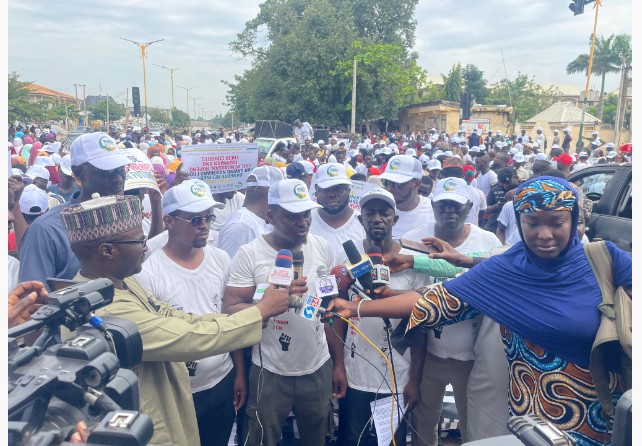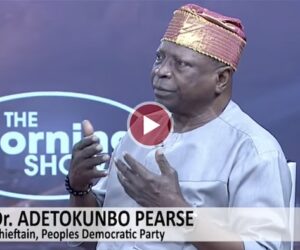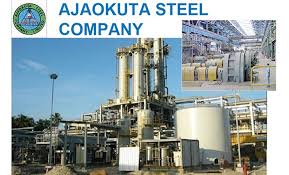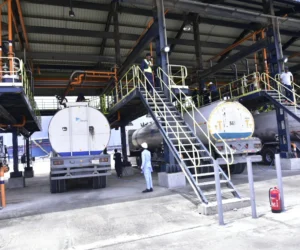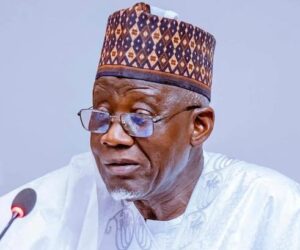

Vice President Kashim Shettima, Monday, said there is need for Nigerians to respect and protect the multibillion-dollar investment of Africa’s richest man, Aliko Dangote.
He described the $20 billion Dangote Refinery with 650,000-barrel-per-day capacity, as a national asset vital to Nigeria’s economic future.
He spoke Monday at the opening of the 2025 Nigerian Economic Summit in Abuja.
The nation’s number two man’s comment came against the backdrop of the recent industrial crisis caused by the Petroleum and Natural Gas Senior Staff Association of Nigeria (ENGASSAN) over alleged sack of about 800 unionised employees at the refinery.


The industrial action was later called off following the federal government’s intervention.
Declaring the summit open, Vice President Shettima stated that the government will expect far-reaching recommendations from the summit in addressing this issue.
He also said the government was also taking steps to protect the industries and create industrial harmony for the good of the nation.
Emphasising the critical importance of the 650,000-barrel-per-day Dangote Refinery, Shettima said: “On this note, I want to dwell on something that is very dear, a very topical issue that is very dear to the heart of every Nigerian.
“Aliko Dangote is not an individual; he is an institution. And he is a leading light in Nigeria’s economic rejuvenation…and how we treat this gentleman will determine how outsiders will judge us. If he had invested $10 billion in Microsoft, in Amazon, or in Google, probably, he might be worth $70 to $80 billion by now. But he opted to invest in his country, and we owe it to future generations to jealously protect, promote, preserve and protect the interest of this great Nigerian.”
While calling on both labour unions and the organised private sector to show restraint and patriotism in resolving industrial disputes, he said: “I wish to call for caution, retrospection, and a deeper sense of patriotism from both labour and the organised private sector in defining and improving the relationship between labour and industry in the interest of maintaining our steadily improving economic fortunes. It’s not about holding the whole nation to ransom because of a minor labour dispute.
“Nigeria is greater than PENGASSAN. Nigeria is greater than each and every one of us. I’m not coming to you as a partisan.”
…What we lost to PENGASSAN strike – NNPC
In a related development, Group Chief Executive Officer of the NNPCL Bayo Ojulari said the nationwide strike by PENGASSAN members cost Nigeria over 200,000 barrels per day of crude oil, and also affected gas production and electricity generation, an official announced on Monday.
He said this Monday after meeting with President Bola Tinubu at the Presidential Villa Abuja.
“In this particular case, we actually lost significant production of over 200,000 bpd that was deferred, we also have gas production that was deferred; we also have power generation that was impacted,” Ojulari said.
| At an average price of $66 per barrel, it means Nigeria lost about $39.6 million (N57.4 billion) worth of crude oil for the three days the strike lasted. |
Premium Times reported the strike called by PENGASSAN, a union of senior oil workers in the oil industry, to protest the sack of its members by Dangote refinery.
…Protests in Kaduna
Meanwhile, thousands of protesters Monday brought parts of Kaduna city to a standstill as they marched under the banner of Partners for National Economic Progress (PANEP).
They accused PENGASSAN of “economic terrorism” and colluding with powerful oil cartels to sabotage the Dangote Petroleum Refinery.
The protesters, chanting solidarity songs and carrying placards which read: “Protect Local Refining,” “End Fuel Import Cartel,” and “Support Dangote Refinery,” converged on the Murtala Mohammed Square before proceeding through Alkali Road, Ali Akilu Road, and Ahmadu Bello Way.
Addressing the rally, PANEP Convener Igwe Ude-Umanta said the Kaduna protest was part of a nationwide campaign to “rescue Nigeria’s economy from cartels who destroyed our public refineries and now want to strangle the Dangote Refinery.”
“This struggle is against the same interests that killed our textile industry and forced Kaduna’s factories to become graveyards. We will not allow them to repeat that in the oil sector. The days of holding Nigeria hostage are over.
“Everybody knows what PENGASSAN did just a few days ago was economic terrorism. They shut down operations deliberately to frustrate the Dangote Refinery. That was not labour activism, it was sabotage,” Ude-Umanta declared.
He said the movement, which began in Abuja on October 2, is a “national liberation effort” to defend indigenous investments and protect Nigeria’s economic sovereignty.
“Kaduna used to be the textile capital of Africa until foreign interests, aided by local collaborators, destroyed it through deliberate policy sabotage. Now they want to do the same with petroleum refining,” he said, adding that such acts were “nothing short of economic terrorism.”
According to him, the recent disruptions by PENGASSAN amounted to sabotage, not labour activism.
“What PENGASSAN did was not unionism—it was sabotage. The government should have arrested their leadership to serve as deterrent. We cannot allow people to hide under labour unions to cripple our economy,” he said.
PANEP urged President Bola Ahmed Tinubu, who also doubles as Minister of Petroleum Resources, to ensure that local refineries like Dangote’s receive crude at the same price sold to foreign refiners, saying that fairness is key to sustaining the refinery and investor confidence.
“The same way imported textiles destroyed Kaduna’s mills, imported fuel is threatening to kill local refining. Other nations protect their industries through tariffs—we must do the same,” they added.
The protesters hailed Dangote Refinery for stabilising fuel prices and creating jobs, calling it “a symbol of Nigeria’s economic rebirth that must not be allowed to fail.”
…ACF condemns union
Similarly, the Arewa Consultative Forum (ACF) condemned what it described as “thinly disguised attempts to sabotage a world-class indigenous investment,” saying the attacks on the Dangote Refinery threatened investor confidence.
In a statement Monday by its National Publicity Secretary, Prof. Tukur Muhammad-Baba, the ACF said entrenched interests were working to maintain their hold on the oil sector, urging the federal government to protect the refinery as a strategic national asset.
“Putting down the Dangote Refinery would be a potent disincentive to both domestic and international investors. It must be protected under national security policy,” the forum warned.
The ACF also urged sanctions against any group or individual violating court orders or attempting to disrupt the refinery’s operations, stressing that “labour rights should not become tools for sabotage.”
Both PANEP and ACF called on Nigerians to rally in defence of local industries and ensure that the Dangote Refinery becomes a model of indigenous success.
…Centre wants law on unlawful shutdown
Weighing in on the development, the Centre for the Promotion of Private Enterprise (CPPE) urged the Nigerian government to come up with a policy framework to prevent the unlawful shutdown of businesses in the country.
CPPE Chief Executive Officer, Muda Yusuf, who disclosed this in a recent statement, said a policy to protect investors is a national economic imperative.
CPPE added that the move would further boost and strengthen investors’ confidence and safeguard investment from labour union disruptions.
“Protecting investors and employers is not a privilege, it is a national economic imperative. Investors mobilise capital, create jobs, and generate the tax revenues that sustain government and society. Without them, there can be no sustained growth, no employment, and no national prosperity.
“Nigeria must, therefore, urgently institutionalise a fair, secure, and predictable business environment that protects those who take risks to create wealth. This is not about weakening labour unions but about balancing rights and responsibilities to foster sustainable economic growth, social stability, and national security,” Yusuf said.

